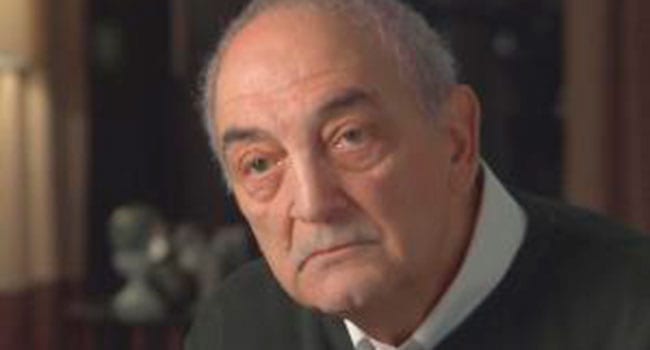 Sonny Vaccaro is to basketball what Marvin Miller was to baseball.
Sonny Vaccaro is to basketball what Marvin Miller was to baseball.
They both have had a profound impact on their games; they both fought valiantly for athletes’ rights; and each of them had to deal with a power establishment that tried to rub them out.
The latest example is ESPN’s The Last Dance documentary about Michael Jordan and the Chicago Bulls’ last championship run. (It’s also being shown on Netflix.)
A big part of Jordan’s evolution from basketball superstar to worldwide celebrity was the endorsement deal Jordan signed with Nike coming out of college. The deal resulted in a massive marketing campaign and the famous signature Air Jordan shoes.
What isn’t as well known is that Jordan’s Nike deal was engineered by Vaccaro.
But as columnist Dan Wetzel pointed out this week, The Last Dance has totally ignored Vaccaro’s role in establishing the Jordan-Nike marriage, the biggest sports marketing partnership in American history.
Vaccaro, on behalf of Nike, was the first to pay college coaches a fee to make sure their players wore Nikes. Today, colleges sign US$100-million-plus contracts with Nike and other shoe and apparel companies.
Of course, the players don’t see any of that money.
Which brings us to Vaccaro’s other important role: Fighting for college athletes’ economic rights. He attacked the absurdity of amateurism in the multibillion-dollar college sports industry and he consistently pointed out the hypocrisy of college coaches, athletic directors and school presidents along the way.
Wetzel recalled the time in 2001 when Vaccaro was called before the Knight Commission on Intercollegiate Athletics, a group of college sports leaders assembled to look at issues in college athletics. Vaccaro was grilled by the committee about the ethics of the proliferating shoe and apparel deals with college athletic programs.
Penn State’s then-president emeritus asked Vaccaro, “Why should a university be an advertising medium for your industry?”
“They shouldn’t, sir,” Vaccaro responded. “You sold your souls and you’re going to continue to sell them. You can be very moral and righteous in asking me that question, sir. But there’s not one of you in this room that’s going to turn down any of our money. You’re going to take it. I can only offer.”
It was a perfect response.
In recent years, as Vaccaro got out of the shoe and apparel business, he has focused on helping college athletes gain the right to specifically profit off their name, image and likeness.
The NCAA has fought against this for decades. But Vaccaro has been persistent. He’s gone to college campuses to speak to athletes and others and lobbied politicians. And he’s convinced former UCLA basketball star Ed O’Bannon to file a lawsuit against the National Collegiate Athletic Association (NCAA) in an attempt to secure name, image and likeness rights for all college athletes.
Vaccaro’s initiative slowly gained momentum and California and Colorado have passed laws to allow college athletes to profit from their athletic talents. Many other states are close behind.
The NCAA is afraid of losing control so it formed a committee to look at the issue. The committee has said it plans to give athletes rights in the near future. However, nothing is in writing yet.
In the meantime, the NCAA is exploring an abundance of restrictions on what athletes will and won’t be able to actually do in the name, image and likeness area.
“This [NCAA] proposal is one step forward, one step back,” tweeted Sen. Chris Murphy, a Connecticut Democrat who has been pushing for more economic rights for college athletes. “The NCAA wants to limit athlete endorsement deals in a way that could make them totally impractical. And the NCAA wants Congress to give it total power of athletes’ compensation. That should be a non-starter.”
The NCAA is fighting a losing battle.
Vaccaro is on the right side of history. The NCAA wouldn’t even be considering giving athletes their rights without Vaccaro and O’Bannon. It’s just a matter of time before college athletes – like Olympic athletes before them – will be able to throw off the cloak of amateurism and secure their economic rights, just like every other student on college campuses.
“It would be hard to find anyone more responsible for shining a light on the hypocrisy of a system that allowed college basketball coaches to make millions dollars in exchange for their teams to wear a particular brand of shoe, while players were prevented from doing anything to monetize their popularity,” wrote Dan Wolken about Vaccaro for USA Today.
Vaccaro is close to winning his long battle with the NCAA.
“I really never, ever thought in my lifetime I’d see it happen,” said Vaccaro. “This was my ultimate fight.”
Meanwhile, he hasn’t been completely shut out of The Last Dance. The back of his head appeared in a photo of Jordan’s meeting with Nike during a recent episode. That’s it. The back of his head.
Sonny Vaccaro deserves a lot more than that.
Ken Reed is sports policy director for League of Fans (leagueoffans.org), a sports reform project. He is the author of The Sports Reformers, Ego vs. Soul in Sports, and How We Can Save Sports.
The views, opinions and positions expressed by columnists and contributors are the author’s alone. They do not inherently or expressly reflect the views, opinions and/or positions of our publication.
